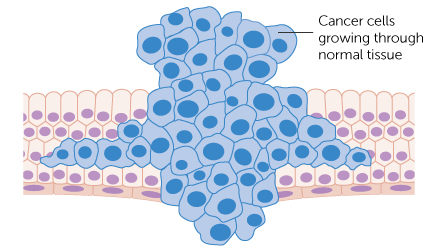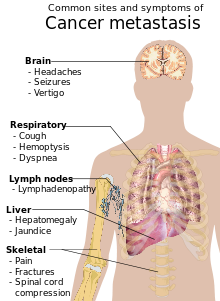GI Cancer - Best Gastrointestinal & Colorectal Surgeon in Bangalore
GI CANCER
Understanding cancer
So, cancer is not just one condition. In each case it is important to know exactly what type of cancer has developed, how large it has become, whether it has spread, and how well the particular type of cancer responds to various treatments. This will enable you to get reliable information on treatment options and outlook
An insight into cells
Normal body cells
The genes are like codes which control the functions of the cell. For example, different genes control how the cell makes proteins, or hormones, or other chemicals. Certain genes control when the cell should multiply, and certain genes even control when the cell should die.
Most types of cell in the body divide and multiply from time to time. As old cells wear out or become damaged, new cells are formed to replace them. Some cells normally multiply quickly. For example, you make millions of red blood cells each day as old ones become worn out and are broken down. Some cells do not multiply at all once they are mature – for example, brain cells. Normally, your body only makes the right number of cells that are needed.
Abnormal cells
What are tumours?
- benign and
- malignant

Non-cancerous (benign) tumours

Cancerous (malignant) tumours
Note: not all cancers form solid tumours. For example, incancer of the blood cells (leukaemia))manyabnormalblood cells are made in the bone marrow and circulate in the bloodstream.
How do cancerous (malignant) tumours grow and spread?
Local growth and damage to nearby tissues
Spread to lymph channels and lymph nodes
Spread to other areas of the body
Why do non-cancerous (benign) tumours not spread to other areas?
Types of cancer
- Carcinomas are cancers that arise from cells which line a body surface, or the lining of a gland – for example, the skin, or the lining of the gut, mouth, cervix, airways, etc.
- Sarcomas are cancers that arise from cells which make up the connective tissues such as bones or muscles. For example, an osteosarcoma is a cancer of bone tissue.
- Leukaemias and lymphomas are cancers of cells in bone marrow and lymph glands (lymph nodes). For example, leukaemia is a cancer of cells that make white blood cells.
Carcinoma in situ
It is thought that one or more of the cells in a carcinoma in situ may then mutate after some time (some genes may be altered). This then gives them the ability to make chemicals to stimulate new blood vessels. The cancer then grows and spreads as described above.
A carcinoma in situ contains only a small number of cells and is usually too small to be detected by scans or X-rays. However, some screening tests may detect a carcinoma in situ. For example, some cells from an abnormal cervical screening test, looked at under the microscope, may show carcinoma in situ. These cells can then be destroyed by treatment which prevents cancer from developing. Sometimes a small sample (a biopsy) taken from a part of the body may show a carcinoma in situ
Grounds of cancer
We all have a risk of developing cancer. Many cancers seem to develop for no apparent reason. However, certain risk factors are known to increase the chance that one or more of your cells will become abnormal and lead to cancer. Risk factors include the following:
Chemical carcinogens
Tobacco/smoke.
Workplace chemicals
Age
Lifestyle factors
If you eat a lot of fruit and vegetables you have a reduced risk of developing certain cancers. The exact way in which they protect against cancer is not fully understood. These foods are rich in vitamins and minerals, and also contain chemicals called antioxidants. They may protect against damaging chemicals that get into the body. We should all eat at least five portions of fruit and vegetables per day (some experts recommend even more).
Eating too much fatty food possibly increases the risk of developing certain cancers.
The risk of developing certain cancers is increased by obesity, lack of regular exercise (physical activity), and drinking a lot of alcohol.
For example, one large research study (cited below) followed up over 55,000 people for 10 years. It looked at lifestyle factors and rates of cancer. The study concluded that by following recommendations on keeping physically active, keeping weight in check, not smoking, drinking alcohol in moderation and having a healthy diet, the risk of developing bowel cancer could be reduced by as much as 23%. But, the study found that even improvement in some of these lifestyle factors had some reduction in risk.
Radiation
Infection
Immune system
Your genetic 'makeup'
Combination of factors responsible for most cancers
The body has certain mechanisms that may protect us from developing cancer. For example, it is thought that many cells that are damaged by carcinogens can repair themselves. Also, the body’s immune system may be able to destroy some types of abnormal cells before they multiply into a tumour. Perhaps one carcinogen may only damage one gene, and two or more genes may need to be damaged or altered to trigger the cells to multiply out of control.
In many cases it is likely that a combination of factors such as genetic make-up, exposure to a carcinogen, age, diet, the state of your immune system, etc, plays a part to trigger a cell to become abnormal, and allow it to multiply out of control into a cancer.
Identification of cancer
If a cancer is suspected from your symptoms
Biopsy
Therapeutic alternatives for cancer
Surgery
Chemotherapy
Radiotherapy
More recently, other treatments have been introduced which include:
Stem cell transplant
Hormone therapy
Immunotherapy
Gene therapy
Special techniques
For some cancers, a combination of two or more treatments may be used. A range of other treatments may also be used to ease cancer-related symptoms such as pain.
The Prognosis for people with cancer
Therefore, it is not possible give an overall outlook (prognosis). See the information about the individual types of cancer for further details. As a general rule, the outlook is usually better the earlier a cancer is detected and treated.
Objectives of treatment
Treatment aims to cure the cancer in many cases. With modern medicines and therapies, many cancers can be cured, particularly if they are treated in the early stages of the disease. (Doctors tend to use the word remission rather than the word cured. Remission means there is no evidence of cancer following treatment. If you are in remission, you may be cured. However, in some cases a cancer returns months or years later. This is why doctors are sometimes reluctant to use the word cured.)
Treatment may aim to control the cancer. If a cure is not realistic, with treatment it is often possible to limit the growth or spread of the cancer so that it progresses less rapidly. This may keep you free of symptoms for some time.
Treatment may aim to ease symptoms in some cases. Even if a cure is not possible, a course of radiotherapy, an operation, or other techniques may be used to reduce the size of a cancer, which may ease symptoms such as pain. If a cancer is advanced then you may require treatments such as nutritional supplements, painkillers, or other techniques to help keep you free of pain or other symptoms.
See some related articles about GI Cancer
What are the primary responsibilities discharged by expert colorectal-surgeons?
If you are getting bothered with small-bowel, rectum or colon issues then you will surely be in need of colorectal-surgery by best colorectal surgeon in Bangalore. Colorectal-surgeons are being assisted by other specialized surgeons like gastroenterologists, urologists, gynecologists and many more. Best colorectal surgeon in Bangalore will first make a thorough examination in order to understand the actual rectum, colon or anus condition.
Currently, best colorectal surgeon in Bangalore is also gaining fame in the name of proctologist. Both diagnostic tests and surgeries are being conducted by these surgeons over colon. Human anus or rectum might get exposed towards any critical diseases and these diseases can be cured only by means of colorectal-surgery.. In some cases, surgery is not necessary at all and the surgeons declare this fact openly in front of the patients. Only critical cases need to be surgically treated.
Qualification of colorectal-surgeons:
Best colorectal surgeon in Bangalore usually obtains certification or degree on surgical-specialization. Without specialization certificate surgeries cannot be performed with great care and high-level sincerity. Medical-school graduation-degree is very much essential in this case and without this degree specialty-certification cannot be acquired. After that, the aspirants need to join surgical-training programs as interns for getting a healthy experience on surgical techniques.
This experience will make a great addition to the overall qualification of the surgeons. They should take minimum five-years of training and this training should be essentially followed by specialty-training for two-years.Specialty-training can enable doctors gaining board-certification. This certification can make the surgeons completely confident and they can also start working in the concerned professional field.
Primary disorders treated by colorectal-surgeries:
Best colorectal surgeon in Bangalore always deals with the following types of disorders.
Key responsibilities:
Best colorectal surgeon in Bangalore needs to be highly sincere and he should know how to discharge his professional duties with acute dedication. Some of the most important duties of these surgeons are as follows:
What to consider for anterior-resection surgery?
Resctosigmoid-colon cancers are usually being treated by means of anterior resection surgery in Bangalore. Double-stapling technique along with intracorporeal anastomosis is found in this surgical process. Small-incisions are usually included for making this surgery more effective and safe.Your doctor will decide which surgical-option is the most suitable for you
Anterior resection surgery in Bangalore demands for high-end skills and this is why patients always choose any expert surgeon. Nowadays, modern surgeons are developing and implementing some of the most advanced resection-methods in order to complete the concerned procedure in a much safer and easier way without bringing any complications.
Things to be considered:
Eating and drinking restrictions need to be maintained essentially after anterior resection surgery in Bangalore. Till the diet becomes normal the patients need to stay under clinical supervision only. The surgeon should follow a proper routine for completing the surgery within time.
Anterior resection surgery in Bangalore also includes few tests after surgery. Leakage-test needs to be conducted well from time to time. If you are facing any trouble in discharging your bowel-wastes after surgery then you should inform the same to your surgeon.
